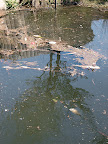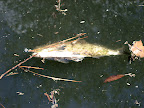In case you haven't heard: Oregon recently passed an impressive set of energy bills [pdf] designed to improve the environment and economy of the Northwest.
From the summary:
House Bill 2210 provides a package of measures to encourage greater development, distribution and use of agricultural and forest material for biofuels, for electricity and for other forms of biomass energy use. The bill expands property tax incentives for biofuel and certain fuel additive production facilities, establishes a new tax credit for producers and collectors of biofuel raw materials, based on Btu content of feedstock, and creates an income tax credit for consumer use of biofuel.The signing was held at Sequential Biofuels' beautiful, super-green flagship biofuel-only fueling station in Eugene, OR. (I'll post more about Sequential later this week...).
House Bill 2210 also establishes a Renewable Fuel Standard for biodiesel and ethanol based on in-state production, prohibits the sale of gasoline that contains MTBE and certain other additives, provides a mandate on State agencies regarding biodiesel for backup power generation, modifies the site certificate exemption criteria for ethanol and biodiesel production facilities to preclude coal-fueled facilities, and allows certain farm biofuel production facilities on land zone for
exclusive farm use (EFU).



